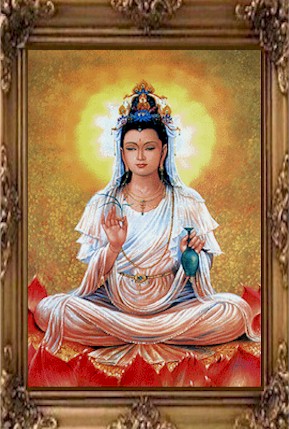
As noted elsewhere, the central message of Buddhism
is, "The world is not as you see it -- change."
What, then, are we supposed to see? How are we supposed to consider this world?
The Buddha provided three basic characteristics to life.
Impermanence
Sometimes it seems we stand at a certain vantage point where a mountain seems
eternal, while a butterfly's life is fantastically short. In reality, all things
are in a state of flux, perhaps a negative way of saying, "All things are
in the process of becoming...."
What, the Buddha asks, are we to cling to? Our bodies? And yet most of us are
all too conscious of the deterioration and decay of our bodies as we age, and
we are aware that the cells in our body constantly remake us from moment to
moment. We take out memberships in gyms to retard the process of aging, but
we are not able to hold back the changes for long. Accumulating wealth and status,
a long line of publications or fine cars, none of this gives us peace of mind
because all of it changes.
By wishing or acting as if things were otherwise, we bring ourselves anguish
and anxiety -- and this is the spirit behind the Buddha's Four Noble Truths,
namely desire as the source of our unhappiness.
The Buddha's last words were: "All things are subject to change. Practice
with diligence..."
Suffering
The Truth of suffering is the first of the Four Noble Truths taught by the Buddha.
Suffering is a fact of life which people can see for themselves. It is one of
the three characteristics of existence.
Whatever is impermanent is also suffering. Everything which arises will last
only for a time, then it decay and finally dies. Repeated birth and death is
hard to endure, It disturbs one's peace and mind and is a cause of suffering.
Thus old age, sickness and death which are evidence of the impermanence of life
are forms of suffering. Since people tend to cling to youth, health, relationship
and material achievements, the realization that these are impermanent, cause
anxiety and fears. It is said that even the gods trembled when the Buddha reminded
them that the heavens are also impermanent.
Understanding that suffering is universal and inevitable enables one to face
the realities of life with calmness of mind. One will be able to cope with old
age, sickness and death without becoming disheartened or desperate. It also
encourages people to look for solution to the problem of suffering just as Prince
Siddhartha did.
No-Self
Who am I? When a person looks at a photograph of themselves when they were a
child, where is that child? Am I, indeed, the same from moment to moment? Hardly
-- one moment I'm happy and content, the next anxious and prone to anger. Out
of convention and convenience we refer to ourselves, as "I", but the
question becomes what is this mysterious I? Is is consciousness? Is it my physical
body? My emotions? My thoughts?
Chasing after this mysterious "I" is a baffling activity and one which
we usually ignore, taking for granted that "I" exist in the sense
that I am a noun, a thing, something that could be identified as a thing-in-itself,
separate from other things.
Yet the Buddha's insight was that there is no self, no "I" to locate.
This is disconcerting to some and small wonder, for it cuts at the very sense
of who we think we are. To make matters worse, many of those who present their
approach to Buddhism emphasize this characteristic of life in a way that can
seem fatalistic. It is almost as if pessimists grab onto Buddhism because it
confirms the worst -- that we simply don't exist.
But, as the Buddha would say, this is a great truth that is liberating, not
defeating. It is a realization that is positive, not negative. True, as we measure
the size of our ego and the corresponding demands that life treat us a certain
way, this can be classified as bad news! What we come to in this (at first)
bitter realization is that we are not things, but events. We are not nouns,
but rather verbs. We are not alone and static, but a process that cannot be
separated from the all that is and will be.
If we are empty of self, says the wonderful Thich Nhat Hahn, then what does
that mean? He uses the example of a piece of paper and says, basically, if you
look at this paper and really see it, you are seeing the tree this was made
from, the person who cut that tree down, the family he or she came from. You
are seeing the rain that gave it nourishment, the sun that provided for its
growth and development, the earth that supported it. If you take away any of
those elements, the paper cannot exist.
The paper, therefore, is empty of anything that we would recognize as paper.
Certain things have come together, interdependently, in this object we call
a piece of paper. So, while the paper is void or empty of self, it is full of
"non-paper elements."
In the same way, we are made up not of a self, but of the stars and the sun,
of the earth and rain, mutually interdependent in ways that are striking that
when we see this, really see it, we have no words. We have, then, seen the world
as it is, not as we imagine or wish it to be, and we see the process in others
around us and in the clouds and in our own state of being.